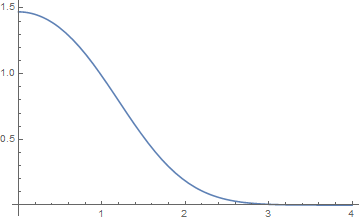Although this question has been answered by a bug statement, I found it interesting to study some aspects in more detail.
The study could not explain the internal cause of the bug.
But, besides taking into account that the OP provides two different integrals the study shows that applying a simple unified regularization procedure leads to correct results.
The two integrals of the OP
The Latex version of the integral is
intLatex = Integrate[(Exp[-(b - r)^2] (-1 + Exp[4 b r]))/(4 b r Sqrt[\[Pi]]), {r, 0, \[Infinity]}, Assumptions -> b > 0]
% /. b -> 1/2.
(*
Out[238]= (1/(8 b Sqrt[\[Pi]]))E^-b^2 (\[Pi] (Erfi[b] - Erfi[3 b]) -
2 b^2 (HypergeometricPFQ[{1, 1}, {3/2, 2}, b^2] -
9 HypergeometricPFQ[{1, 1}, {3/2, 2}, 9 b^2]))
*)
(*
Out[239]= -0.1717
*)
It gives the wrong result of a negative value even though the integrand is positive.
For comparison, the numeric integration gives the correct value
intLatexN =
NIntegrate[(Exp[-(b - r)^2] (-1 + Exp[4 b r]))/(4 b r Sqrt[\[Pi]]) /.
b -> 1/2., {r, 0, \[Infinity]}]
(*
Out[270]= 2.56822
*)
The version of the integral provided in the MMA code is (it has (r+b) instaed of (r-b) in the exponent
intCode = Integrate[(E^-(b + r)^2 (-1 + E^(4 b r)))/(4 b Sqrt[\[Pi]] r), {r, 0, \[Infinity]}, Assumptions -> a < 2]
% /. b -> 1/2.
(*
Out[266]= (E^-b^2 (-Log[-b] + Log[b]))/(4 b Sqrt[\[Pi]])
*)
(*
Out[267]= 0. - 0.690194 I
*)
Again the numeric values for comparison:
intCodeN =
With[{b = 1/2},
NIntegrate[(E^-(b + r)^2 (-1 + E^(4 b r)))/(4 b Sqrt[\[Pi]] r), {r,
0, \[Infinity]}]]
(*
Out[273]= 0.424436
*)
Hence the symbolic integration over the positive integrand leads to a purely imaginary value which has no appearent relation to the true value.
Modifications
Here we discuss two modifications, first we replace the inverse of $r$ by a real power of $r$, and secondly we provide an even simpler example of the buggy situation.
Denominator
If we modify the denominator of the integrands replacing 1/r by 1/r^p, where p > 0 is an auxiliary parameter, we get correct results in the limit p->1
intLatexp =
Integrate[(Exp[-(b - r)^2 ] (-1 + E^(4 b r)))/(4 b Sqrt[\[Pi]] r^p), {r,
0, \[Infinity]}, Assumptions -> p < 2]
Limit[%, p -> 1]
% /. b -> 1/2.
(*
Out[328]= (1/(8 b Sqrt[\[Pi]]))E^-b^2 (Gamma[
1/2 - p/2] (-Hypergeometric1F1[1/2 - p/2, 1/2, b^2] +
Hypergeometric1F1[1/2 - p/2, 1/2, 9 b^2]) +
b p Gamma[-(p/2)] (Hypergeometric1F1[1 - p/2, 3/2, b^2] -
3 Hypergeometric1F1[1 - p/2, 3/2, 9 b^2]))
*)
$\frac{e^{-b^2} \left(-\text{Hypergeometric1F1}^{(1,0,0)}\left(0,\frac{1}{2},b^2\right)+\text{Hypergeometric1F1}^{(1,0,0)}\left(0,\frac{1}{2},9 b^2\right)+\pi (\text{erfi}(3 b)-\text{erfi}(b))\right)}{8 \sqrt{\pi } b}$
(*
Out[330]= 2.56822
*)
intCodep =
Integrate[(Exp[-(b + r)^2 ] (-1 + E^(4 b r)))/(4 b Sqrt[\[Pi]] r^p), {r, 0, \[Infinity]}, Assumptions -> p < 2]
% /. p -> 1
% /. b -> 1/2.
(*
Out[292]= (
Gamma[1 - p/2] Hypergeometric1F1[(1 + p)/2, 3/2, -b^2])/(2 Sqrt[\[Pi]])
*)
(*
Out[293]= (E^-b^2 Sqrt[\[Pi]] Erfi[b])/(4 b)
*)
(*
Out[294]= 0.424436
*)
Simplified problem
This integral has a similar problem: positive integrand but complex result with negative real part
intSim = Integrate[Exp[-r^2] (Exp[r] - 1)/r, {r, 0, \[Infinity]}]
% // N
(*
Out[307]= 1/4 (-2 \[Pi] (2 I + Erfi[1/2]) + HypergeometricPFQ[{1, 1}, {3/2, 2}, 1/4])
*)
(*
Out[308]= -0.693664 - 3.14159 I
*)
The true value is
intSimN = NIntegrate[Exp[-r^2] (Exp[r] - 1)/r, {r, 0, \[Infinity]}]
(*
Out[313]= 1.23826
*)
This substitution removes the error
r^2 -> z, dr = 1/2 dz/Sqrt[z]
intSims = 1/2 Integrate[Exp[-z] (Exp[Sqrt[z]] - 1)/z, {z, 0, \[Infinity]}]
% // N
(*
Out[310]= 1/2 (\[Pi] Erfi[1/2] + 1/2 HypergeometricPFQ[{1, 1}, {3/2, 2}, 1/4])
*)
(*
Out[311]= 1.23826
*)
Again the real power limit gives the correct result:
intSimp = Integrate[Exp[-r^2] (Exp[r] - 1)/r^p, {r, 0, \[Infinity]},
Assumptions -> p < 2]
% /. p -> 1 (* does not work Limit required *)
Limit[%%, p -> 1]
% // N
(*
Out[320]= 1/2 (Gamma[1/2 - p/2] (-1 + Hypergeometric1F1[1/2 - p/2, 1/2, 1/4]) +
Gamma[1 - p/2] Hypergeometric1F1[1 - p/2, 3/2, 1/4])
*)
During evaluation of In[320]:= Infinity::indet: Indeterminate
expression 0 ComplexInfinity encountered. >>
(*
Out[321]= Indeterminate
*)
$\frac{1}{2} \left(\text{Hypergeometric1F1}^{(1,0,0)}\left(0,\frac{1}{2},\frac{1}{4}\right)+\pi \text{erfi}\left(\frac{1}{2}\right)\right)$
(*
Out[323]= 1.23826
*)
Conslusion
Although we could not clarify the reason for the bug we have shown that it appears similarly in even simpler related situations.
All integrals investigated here can be given a consitent meaning if understood as a limit p->1 of the integral over an integrand "regularized" by replacing 1/r by 1/r^p.


b$\endgroup$DawsonF[b]/(2b)$\endgroup$